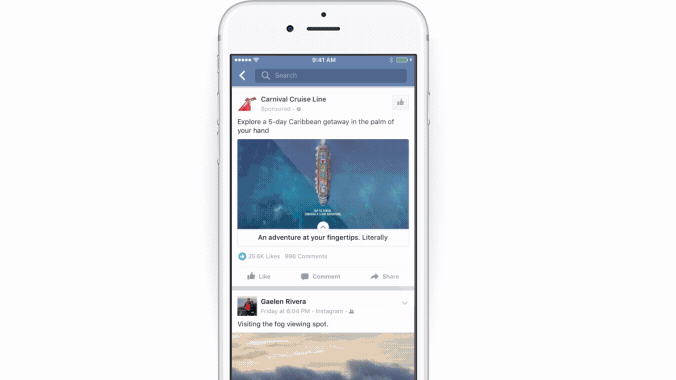On the 26th of February Facebook launched its newest product for marketers: Facebook Canvas. Canvas is a clearly new interactive, full-screen mobile ad unit. It’s an elegant way, not only to get in touch with users, but mostly to engage users directly on Facebook’s page, and at least with their most beloved brand.
Just a cool new toy for marketers?
Facebook Canvas is a stunning new instrument for advertisers to play with, to drive brand awareness and take clients into a new world of brand experience. But there is still a form of time lag once the customer clicks on it. Some sources say Canvas is not ready for the agencies or advertiser clients to convert direct measurable results. It could take three to six months for advertisers to build up a creative brand world, in order to track performance directly. It’s not the first time Facebook has launched new products while “letting advertisers and agencies take time to develop them into tools that are ready for direct response purposes”, says Sigal Barekter, founder of ad tech company Taptica.
So, it’s all about being open for that kind of innovation, testing it’s possibilities and bringing it to a high performance level.
It’s not only about the click
The problem is that advertisers generally measure their success by how much the client’s app is used. The Canvas ad instead tries to keep users within the Facebook browser rather than sending them to another landingpage. It’s clearly discernible that Facebook is on a way to change well-known standard metrics. Metrics such as engagement or time-on-site have an impact rather on the performance than clicks to an advertiser’s site. One reason for Facebook taking this step is that many advertiser sites are slowly loading on portables. Thus users get frustrated and abandon those sites. By having ads within the Facebook app, these ads can be loaded instantaneously – within seconds (to the delight of customers).
“This is not a direct response format at all”, said Guillaume Lelait, U.S. managing director of Fetch, a mobile ad agency that has been quick to test Facebook ads. It’s not about driving an action, it’s good for showcasing. Facebook Canvas ads will be first published on a brand’s Facebook page where people engage with their brand. After this step advertisers may launch an external campaign to target new users. So advertisers can’t build links into the ad that point externally to their page.
Tell me more of it….
Canvas is an evolution of the earlier Carousel ad. Canvas offers for it’s first time full-screen ads; complete mini websites designed around a special product. This includes slideshows, descriptions, videos and a scrollable, interactive interface. Sounds brilliant? Oh yes!
Watch the following video to discover the world of Canvas:
Test users have responded positively to the ads, says Facebook. Users spend on average 31 seconds per ad, and over 70 seconds for the best ones. Sounds brilliant! The ads were designed to be unobtrusive for the end user and are easy to handle for advertiser, built via Web interface no coding or design skills are necessary.
It’s all about the strategy
Canvas impresses its users with multimediality. Photos, suggestive texts and videos with viral potential can be easily embedded. Advertisers can tell mobile brand stories and engage users to interact with their brand in different ways, giving advices, solutions and much more.
Marketers have to build an unique and a thoroughly considered brand strategy, because once online your Canvas can not be changed. Canvas offers extremely high potentials, more than any other ad on Facebook before. Not the technology determines the success of the brand strategy, but the conceptional force.
Face the most important details
Creating a Canvas requires an excellent copy-strategy:
- What kind of objectives are you following with Canvas?
- In which context of use is your user obtaining your message?
- Which landing-page is your Canvas leading to?
- What is the USP of your Canvas?
- What kind of benefit does your Canvas represent?
- What is the big message, which story are you trying to tell?
…. Now it’s only up to you!
Sources:
https://onlinemarketing.de/news/facebook-canvas-date-marke
https://www.luxurydaily.com/facebook-canvas-success-depends-on-unique-content-paired-with-data/
https://digiday.com/brands/canvas-fits-loccitanes-facebook-advertising/


Comments are closed.